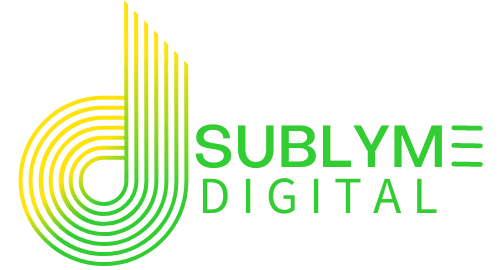
Author: Graham Davidson
Graham Davidson is the Owner and Chief Marketing Guru of Sublyme Digital, leading the agency’s remote-first approach to deliver impactful web design, SEO, and digital growth strategies for businesses across North America.
Make Your Website the Go-To Answer for ChatGPT Queries
Imagine this: A potential customer asks ChatGPT, “What’s the best digital marketing agency for small businesses?” Within seconds, ChatGPT provides a list of recommendations—but your business isn’t on it.
In today’s fast-evolving digital landscape, this scenario is becoming more common. AI-powered tools like ChatGPT are no longer just futuristic novelties—they’re actively shaping how people discover, research, and choose businesses. With over 1.4 billion monthly visits, ChatGPT has quickly become a trusted advisor for consumers seeking everything from local restaurants to web designers and niche service providers. Its influence is growing, and the recommendations it gives are increasingly shaping real-world buying decisions.
Key Takeaways:
- ChatGPT and voice assistants are reshaping how users find businesses, making conversational SEO essential.
- Optimizing for ChatGPT involves answering common questions, leveraging structured data, and creating high-quality, authoritative content.
- Featured snippets, schema markup, and user-focused content are critical for visibility in AI-generated answers.
- Businesses can gain a competitive edge by targeting long-tail, conversational keywords and monitoring user behavior.
- Staying updated with AI and voice search trends is key to long-term success.
Why You Need to Focus on ChatGPT and Voice Search Optimizations
The Shift to Conversational Search
Here’s the thing: people don’t speak the way they type. When you’re talking to a voice assistant or ChatGPT, you’re more likely to say, “What’s a good place for brunch near me?” rather than typing “best brunch Toronto.” It’s casual, conversational, and to the point.
This shift is huge for businesses. It means your content needs to sound like it’s part of a conversation—not a lecture. ChatGPT loves content that feels natural, answers questions clearly, and gets straight to the point.
The Business Opportunity
Think about it: if someone asks ChatGPT for a recommendation in your industry, and your business pops up, you’re already ahead of the competition. But to get there, you need to create content that’s easy for AI to understand and recommend. Let me explain how.
How to Optimize Your Website for ChatGPT and Voice Search
1. Understand Conversational User Intent
Let’s start with the basics: what are people actually asking? With ChatGPT and voice search, users often phrase their queries as questions. For example:
- “What’s the best way to improve my website’s SEO?”
- “How much does digital marketing cost?”
- “What should I look for in a marketing agency?”
To get inside your audience’s head, try tools like AnswerThePublic or even ask your sales team what questions they hear the most. The goal? Write content that feels like you’re answering someone’s question directly—because you are.
Optimizing for ChatGPT isn’t just about SEO—it’s about becoming the trusted answer your audience is searching for.

2. Use Long-Tail Keywords
Here’s a fun fact: voice search queries are usually longer than text searches. That’s because people tend to ramble a bit when they talk (don’t we all?).
Instead of targeting “SEO services,” try phrases like:
- “What are the best SEO services for small businesses?”
- “How can I improve my website’s SEO in 2025?”
These long-tail keywords make your content more likely to match conversational queries. Plus, they’re often less competitive, which is a win-win.
3. Write in a Conversational Tone
Let’s be real—nobody enjoys reading content that sounds like it was written by a robot. To connect with your audience, keep your tone friendly and approachable. Use contractions, short sentences, and even a dash of humor where it feels natural.
For example:
- Instead of: “Businesses must consider the benefits of optimizing their content for AI-driven search engines.”
- Try: “Want more people to find your business? Start optimizing your content for AI-driven searches—it’s easier than you think.”
4. Structure Content for Quick Answers
When people use voice search, they’re usually looking for a quick answer. That’s why it’s important to structure your content in a way that makes it easy to scan.
Here’s how:
- Use headers to break your content into sections (e.g., “What is ChatGPT Optimization?”).
- Start each section with a clear, concise answer.
- Use bullet points or numbered lists to organize information.
Think of it like this: your content should feel like a cheat sheet for anyone looking for answers.
5. Leverage Schema Markup
Let’s talk tech for a second. Schema markup is like giving AI a roadmap to your content. It tells tools like ChatGPT what your page is about, making it easier for them to recommend you.
Use structured data to highlight:
- Your business details (name, address, phone number).
- FAQs.
- Product or service information.
Adding schema markup might sound intimidating, but tools like Google’s Structured Data Markup Helper make it a breeze.
6. Target Featured Snippets
Featured snippets are those little answer boxes that show up at the top of Google search results. ChatGPT loves pulling information from them, so getting your content featured is a big deal.
To optimize for snippets:
- Answer common questions directly and clearly.
- Use lists, tables, or bullet points for clarity.
- Position your answers near the top of the page.
For example:
Question: “What is ChatGPT optimization?”
Snippet Answer: “ChatGPT optimization involves tailoring your website’s content to align with AI-driven queries, focusing on conversational keywords and structured data.”
7. Monitor User Behavior
Here’s a tip: pay attention to how people interact with your site. Are they sticking around to read your content, or bouncing after a few seconds?
Metrics like bounce rate, time on page, and click-through rate can tell you what’s working—and what’s not. Tools like Google Analytics and Hotjar can help you track these behaviors and make improvements.
8. Promote Your Content Across Channels
Don’t wait for people to stumble upon your content. Share it on social media, send it in email campaigns, and even consider running ads. The more engagement your content gets, the more likely it is to be recommended by ChatGPT.
We Build Cool
Success Stories
365 Data Centers
Discover how we rapidly rebuilt and optimized a 30-page website for 365 Data Centers, restoring their online presence and managing digital ad campaigns across key regions to drive engagement and growth.
XTECH Football Pads
Discover how we transformed XTECH Football Pads‘ digital presence, boosting their online sales and tripling website traffic through innovative website development and user experience enhancements.
BeEarth Foundation
Discover how we partnered with the BeEarth Foundation to develop a website that aligns with their mission of sustainability and global engagement. Our work has significantly increased their online visibility and engagement, supporting their efforts to promote sustainable development.
We Recycle Solar
Learn how we illuminated digital success for We Recycle Solar by completely redesigning their website to reflect their leadership in the growing solar recycling industry and implementing strategic digital advertising campaigns that enhanced their visibility at key industry events.
Preferred Home Health Care & Nursing Services
Explore how we elevated the digital presence of Preferred Home Health Care & Nursing Services by enhancing their website for better lead generation, building a dedicated site for staff recognition, and optimizing SEO for their location pages.
What Our Clients Say: Elevating Online Success
FAQs:
Answer: ChatGPT prioritizes content that’s clear, relevant, and authoritative. Structured data and user engagement also play a role.
Answer: While they share similarities, ChatGPT optimization focuses on conversational content and schema markup tailored for AI-driven queries.
Answer: Any business can benefit, but industries like e-commerce, local services, and SaaS are particularly well-suited.
Answer: Use analytics tools to monitor traffic, engagement, and keyword rankings. Heatmaps can provide additional insights.
Answer: No, it’s an ongoing process. As AI evolves, so should your strategies.
Final Thoughts:
The rise of ChatGPT and voice assistants is fundamentally changing how businesses are discovered online. No longer is it enough to rely solely on traditional SEO tactics or hope that your website’s keyword rankings will drive the right traffic. AI-driven platforms are now the gatekeepers to consumer attention, and their algorithms reward websites that offer clear, conversational, and authoritative information.
Let's Build Something Sublyme
Need help optimizing your website for ChatGPT and voice search? Contact Sublyme Digital today and let’s make your content the trusted answer in AI-driven searches!



